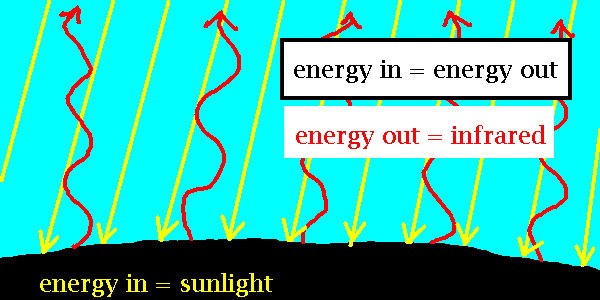Venus's Temperature
Let's ask the question, how hot is Venus?
We don't need to be very exact; we just need a rough estimate.
We deliberately ignore the atmosphere of Venus.
The basic idea:

How much is the energy in?
- Amount of energy received from Sun per square meter per second:
654 watts/meter2
- Of this, 65% is reflected back into space. So 35% of 654 w/(m2 s) is absorbed:
Ein = 229 watts/meter2
The energy received from the Sun is more than the earth, but a greater fraction is reflected
(from the clouds).
How much is the energy out?
- To be precise, we want the energy radiated per second per square meter from
an "ideal" hot surface called a black body .
- It depends on the temperature T (measured in Kelvins).
- It involves a constant
(sigma) = 5.7x10-8 watts/(m2 K4).

Just set these equal:
(sigma) T4 = 229 watts/meter2
so
T4 = 229 watts/meter2/(sigma)
or
T4 = [229 /(5.7x10-8)] K4 = 4.0 x 109 K4
We just need the value of T such that T4 is 4.0 x 109:
T = 250 K
That's not close at all.
The real surface temperature is 730 K.
But this is more or less right for the temperature at the top of the clouds.
Why is Venus hotter than the blackbody law would suggest?
ASTR 121 Home
Davison E. Soper, Institute of Theoretical Science,
University of Oregon, Eugene OR 97403 USA
soper@bovine.uoregon.edu


